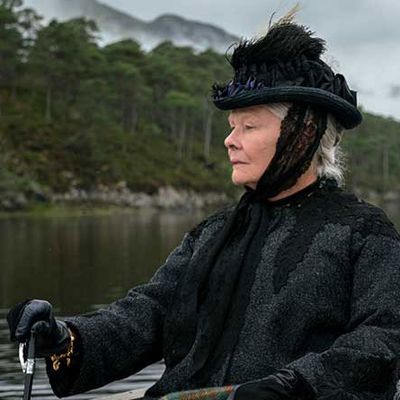
Will the people who walk out of Victoria & Abdul dabbing their tears and burbling that racism is oh-so-terrible and Judi Dench is oh-so-Best-Actress-y think they’ve seen a good movie?
It bears a passing resemblance to a good one: The Victorian costumes and royal palaces look authentic and the soft, dispersed light conjures up a dying, fin de siècle mood. The story is partly true — and revelatory. An old woman — Victoria (Judi Dench), a queen who has lost the will to live — reaches out to a young man, Abdul (Ali Fazal), of a different hue, culture, and religion and is rejuvenated, while representatives of a bigoted, colonialist empire stand glowering with disapproval.
Until recently, historians had minimized the presence of Abdul Karim, who began as a sort of exchange servant (one of Victoria’s titles was “Empress of India”) before becoming her Munshi (teacher). The Queen’s household — and her son, Bertie (a.k.a. King Edward VII), viewed Karim as a sort of proto-Rasputin for insinuating himself into the Queen’s graces, presumably as a swift way to wealth and power. As the movie shows, Victoria was hardly in the ground before Bertie (played by Eddie Izzard) directs that photos and letters connected to Karim be burned, along with papers the queen had written in Urdu. (You read that correctly. Queen Victoria learned to read and write Urdu.)
The chief — though hardly the only — problem with Victoria & Abdul is that too much political correctness proves to be as bad for drama as too little. As conceived by screenwriter Lee Hall (who adapted a book by Shrabani Basu) and director Stephen Frears, Abdul is a hole in the screen: handsome but maddeningly unfilled-in.
Against stern orders, he locks his dark eyes on Victoria’s baby blues during her Jubilee and kisses her feet when presenting a gift. A short time later he’s spinning yarns about his life and culture while Victoria drinks in his good looks. Karim is plainly eager to better his status, but what the filmmakers want you to register is that every time the queen tells an aghast lord or lady-in-waiting, “I would like him by my side/in my office/in my palace/alone with me,” it’s a blow to the ruling class. (“I can take a Muslim wherever I like,” she announces.) The people around Victoria represent the repressive white order, while the monarch herself is unprejudiced, curious, at times even healthily vulgar — the opposite of a snob. She’s meant as the very embodiment of noblesse oblige.
It’s not that Victoria wasn’t historically so pure (although she wasn’t — she thought the prime minister at the time, Gladstone, was too soft compared to his predecessor, Disraeli), it’s that the story has been turned into a sort of Driving Queen Victoria. Everything Abdul does is supposed to enchant her — and us. Her doctor (Paul Higgins) does break the news to Victoria that Abdul — with his near 100 percent black-veiled wife and mother — is riddled with gonorrhea, but it’s as if the screenwriter then said, “We can’t go there.” (Another possibility: Scenes illustrating Karim’s less savory side were cut.) After several years, the real Abdul worked relentlessly on Victoria to get himself a knighthood. But in the film, she introduces the idea herself to an appalled household, which triggers constant surveillance on Abdul and a nasty attempt to bribe (and, failing that, threaten) his ill friend, Mohammed (Adeel Akhtar). The change makes Abdul seem serenely passive — “whatever Her Majesty wants” — instead of ambitious and often self-serving. His shining-eyed nobility is, as my teenage daughter might put it, boring as fuck.
It’s true that the real Abdul managed to alienate the queen’s household, but he’s so much of a saint here the malignity seems either motiveless or the pure product of racism. (The actual household would have been less shocked by the presence of an Indian— Indian servants, ambassadors, and officials were all over the place.) The top-flight supporting cast— including Olivia Williams as Lady Churchill, Tim Pigott-Smith as Sir Henry Ponsonby, Fenella Woolgar as Miss Phipps, and Michael Gambon as Lord Salisbury — is left to pull frowny faces. (Higgins could have blown the movie open with one of his obscene Jamie MacDonald tirades from The Thick of It/In the Loop.) Only Akhtar’s interrogation scene hits home — his morbid satisfaction at Bertie’s rage is superb.
Frears, now 76, went from making startlingly tough-minded British TV movies to even better films, among them My Beautiful Laundrette, Dangerous Liaisons, and The Queen. But in the last few years his touch has gotten heavier and more dodderingly tasteful. His Florence Foster Jenkins seemed edited for hard-of-hearing older audiences, and Victoria & Abdul is even more whacking. An early banquet sequence (whenever Victoria finishes a course, it’s whisked away, to the dismay of guests still eating) would have been perfection if it had been handled lightly.
Dame Judi, however, is every bit as good as you’ve heard — perhaps even better. You never catch her playing Victoria for laughs, only as a woman trapped in a failing body and longing either for death or transcendence. What the screenplay leaves blank, she fills in with her searching eyes, her mixture of curiosity with a lifetime of entitlement. And though she knows she will never have Abdul physically, a glance here and a gaze there let you know she most definitely has the Munshis.


